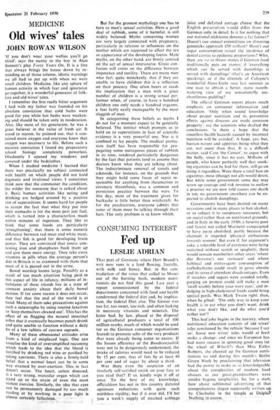CONSUMING INTEREST
Fed up
LESLIE ADRIAN
That part of Germany where Herr Brandt's writ now runs is a land flowing, literally, with milk and honey. But, in flat con- tradiction of the voice that called to Moses out of the burning bush, modern nutri- tionists do not find this good. Last year a report commissioned by the federal departments concerned with food and health condemned the federal diet and, by implica- tion, the federal Diet also. The former was too fat, too sweet, too rich, and often lacking in necessary vitamins and minerals. The latter had, by law, placed at the disposal of agricultural producers a total of 100 million marks, much of which would be used (or so the German consumer organisations feared) to promote sales of the very products that were already being eaten to excess. If the lissom efficiency of the Bundesrepublik were not to be dangerously undermined, the intake of calories would need to be reduced by 15 per cent, that of fats by at least 40 per cent and of sugar by about a third.
Was there even the suspicion of an insularly self-satisfied smirk on your face as you read that? If so, kindly wipe it off at once. To the best of my knowledge, officialdom has not in this country dictated optimum reductions with quite such mirthless rigidity; but if it ever did, I'll bet you a week's supply of strained cabbftge
juice and defatted cottage cheese that the English prescription would differ from the German only in detail. Is it for nothing that our national nickname denotes a fat farmer? Doesn't our annual expenditure on slimming gimmicks approach f50 million? Hasn't our sugar consumption raised the incidence of dental carries to epidemic proportions? Who, then. are we to throw stones if German food traditionally puts on stones; if 'everything which can be served with dumolings is served with dumplings' (that's an American speaking); or if the clientele of Cologne's wonderful Hans-Stube rose last summer as one man to obtain a better, more mouth- watering view of my sensationally sac- chariferous pudding?
The official German report places much emphasis on consumer information and education. 'Only when sound knowledge about proper nutrition and its preventive effects against diseases are made common property', say the scientists who drafted the conclusions. 'is there a hope that the countless health hazards caused by incorrect nutrition will be avoided'. A hope, yes; but, human nature and appetites being what they are, not more than that. It is a difficult matter, said Cato 'the Censor', to argue with the belly, since it has no ears. Millions of people, who know perfectly well that smok- ing cigarettes can be bad for them, still go on doing it regardless. Were there a total ban on cigarettes, most (though not all) would desist. But while some government some day may screw up courage and risk revenue to outlaw a practice we are now told causes one death in ten, no government anywhere can be ex- pected to abolish dumplings.
Governments have been desired on many occasions and in many places to ban alcohol, or to subject it to sumptuary measures, but on social rather than on nutritional grounds; and in Italy in the early 1930s a futurist poet and fascist nut called Marinetti campaigned to have pasta abolished, partly because (he claimed) it impeded 'physical enthusiasm towards women'. But even if, for argument's sake. a tolerable level of existence were being sustained without scotch or spaghetti. there would remain numberless other areas 'where das Betreten's not verboten' and where habitual and extravagant consumption of carbohydrates could result in gross obesity and its several attendant disadvantages. Even if starches and sugars were avoided totally, gorging on protein could still make a man 'swell wisibly before your wery eyes', and in- dulging in high-cholesterol foods could bring special perils. Was Mark Twain right, then, when he gibed : 'The only way to keep your health is to eat what you don't want, drink what you don't like, and do what you'd rather not'?
This bad joke begins in the nursery. where nutritional education consists of old wives' tales sanctioned by the refrain 'because I say so'. Some new wives' tales would at least make a change; and since no European has had more success in spinning good ones (at the wheel of Which?) than Miss Eirlys Roberts, she cheered up the German nutri- tionists no end during this month's Berlin Green Week by proclaiming that television had the power to make us as knowledgeable about the complexities of modern food choices as our great-grandmothers were amidst bygone simplicities. So, for a start, how about subliminal advertising of that comprehensive slogan supposedly written up by Cleobulus in the temple at Delphi?
Nothing in excess. •


































 Previous page
Previous page